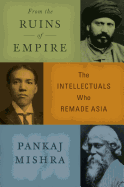
In From the Ruins of Empire, Pankaj Mishra returns to the intersection of Asian and Western cultures that informed his earlier work, Temptations of the West. He begins with the statement that the intellectual and political awakening of Asia--the central event of the 20th century for much of the world's people--came about through a new class of Western-educated elites who, as a group, rejected their Asian heritage in favor of Western modes of thought, then later re-embraced their native traditions, while transforming them in the process.
Mishra focuses his argument on the intellectual journeys of three men who are important historical figures in their own cultures but largely unfamiliar to most Westerners. Journalist and political activist Jamal al-Din al-Afghani (1838-97) was a founder of Islamic modernism. Chinese intellectual Liang Qichao (1873-1929) inspired a generation of young Chinese activists with his calls for reform. Indian poet and Nobel Laureate Rabindranath Tagore (1861-1941) was a leader of the Bengal Renaissance.
Mishra shows how these three men were shaped by, and responded to, European imperialism in Asia, giving Western readers a new perspective on that era. His stated goal is not to replace a Eurocentric view with an "equally problematic Asia-centric one," but to look at both the past and the present from multiple viewpoints. For the most part, he succeeds. --Pamela Toler, blogging at History in the Margins

